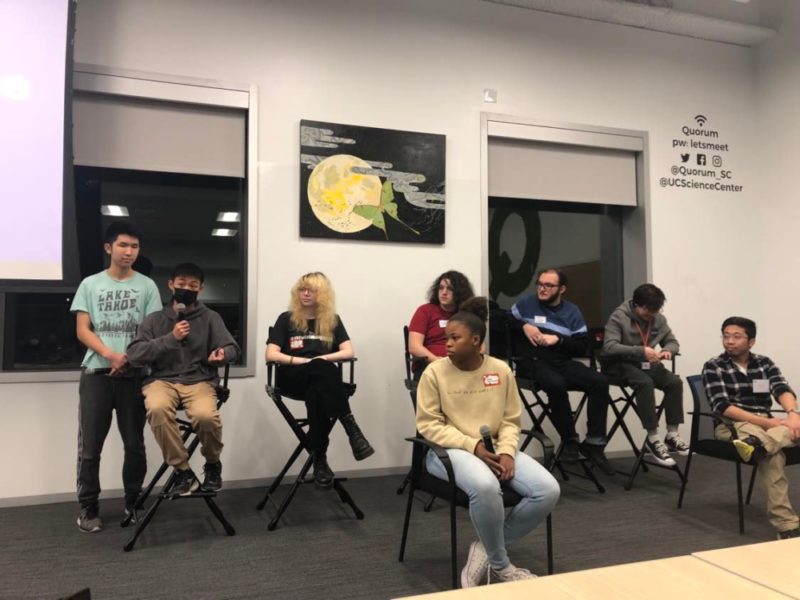Erik Weissman, computer science teacher at the Academy at Palumbo, a magnet school in South Philly, thinks that the industry should ask these students themselves.
Weissman brought in his past and current students for a panel about their experiences studying computer science at CS4Philly’s Computer Science Education Week Forum on Wednesday night. The event was one of many marking National Computer Science Week last week, including a kickoff event hosted by the School District of Philadelphia on Monday, as it encouraged all schools in the district to participate in hour of code.
Palumbo offers three computer science courses: regular computer science, AP computer science principles and AP computer science A. Weissman said a lot of students at the school are would-be first-generation college students.
“I can’t stress that enough because it is a different challenge when you’re in a school that has students that don’t know that they can go to college,” he said. “I do think that challenge is solvable, though. And I do think that you can turn around a kid, especially with computer science from freshman year to senior year, if we’re given an opportunity to work with them for three to four years, not just for half a year or something.”
Naomi G. Housman, cofounder of CS4Philly, noted that students voices are rarely heard in these conversations, but she thinks they should be.
“We wanted to hear from them directly. It’s really always important when you’re having discussions about education,” she said. “They are the future. They are going to tell us how to make it fun, how to make it interesting, how to make it attractive, and how to engage them.”
Here are three takeaways from the panel:
1. Students need both external and internal motivation
Dylan Janssen, a 12th grader, said his dad was an original Apple developer, and his dad’s excitement for computer science motivates him to keep pursuing the field.
“We don’t really have a lot of money,” Janssen said, “but I want to go to college for computer science and he’s willing to support me no matter what, and that’s giving me the confidence to keep going and doing what I want to do.”
Family support doesn’t have to come from a blood relative, he added — it can come from anyone who supports you in your life.
Aasyia Craft-Williams is studying computer science at Drexel University. She said her family is supportive of her academic pursuits as long as she’s getting good grades, but they didn’t really know what computer science was. She based her decision to continue in computer science off of what she alone wants to do.
Jeffrey Chen, a 10th grader, agreed with both of his peers, saying that family and support is important, but at the end of the day, each student has to have their own motivation to keep learning.
2. Break it down: Why does this subject matter?
Craft-Williams said the only reason she got into computer science was because Weissman kept telling her she was good at it and that she should take another course. His encouragement to take three years of the subject in high school helped her choose her major in college.
Since her family didn’t know a lot about computer science, Craft-Williams said she wouldn’t have thought about or cared about the subject much, had it not been for people like Weissman continually encouraging her.
“If you want children to do something — you want anyone to do something — you have to advertise it. You have to make your product entertaining,” she said. “The real question is, ‘Why would we want to?'”
3. Repeated exposure matters
A student named Andy who is a computer science major at Drexel University said resources outside of school kept him interested in computer science, such as social media accounts and groups dedicated to the topic as well as peer mentors. He also gave the example of Coded by Kids as a resource for keeping students’ interest.
“It can encourage a lot of students to step out of their comfort zone,” he said, “building a really cool project and potentially winning a lot of money for it.”
Ruby Malce, an 11th grader, said their middle school offered a STEM program. Early exposure is nice, Malce said, but repeated advertising of the subject is important.
Chen said he also got to experience computer science in middle school, but didn’t think much of it. Looking back, he wished he had taken it more seriously because it would have helped in high school to have a stronger early foundation.
Craft-Williams agreed that learning the basics in middle school would’ve helped her going forward: “It would probably be just learning basic syntax,” she said because then “it’s easier to transfer to another language.”
So: Why should teenagers care about computer science? It helps them see themselves in a tech-forward future.
Sarah Huffman is a 2022-2024 corps member for Report for America, an initiative of The Groundtruth Project that pairs young journalists with local newsrooms. This position is supported by the Lenfest Institute for Journalism.Join the conversation!
Find news, events, jobs and people who share your interests on Technical.ly's open community Slack

Philly daily roundup: Student-made college cost app; Central High is robotics world champ; Internet subsidy expiration looms

Philly daily roundup: Earth Day glossary; Gen AI's energy cost; Biotech incubator in Horsham

Philly daily roundup: Women's health startup wins pitch; $204M for internet access; 'GamingWalls' for sports venues


